Catalogue of remarkable citizen innovations 2020 : 5. Transport and mobility
Puissance des idées simples qui réenchantent le monde !
septiembre 2020
Innovation Citoyenne et Développement Durable (ICDD)
On the occasion of the 2020 Produrable Fair, in a difficult context due to a particularly aggressive pandemic, which challenges our lifestyles, our ways of producing and trading, as well as our modes of governance, the ICDD association is pleased to present some thirty innovations or remarkable citizen initiatives that it is currently supporting
Concerning climate issues, or the necessary abandonment of fossil fuels in the short or medium term, it was frequently said in high places that a solution would be found: Each time a major problem was posed, it seemed that a solution was always found, until now.
« Don’t worry: we’re taking care of you and everything is under control: you can come and go as you please. In fact, it has become clear, especially with the arrival of the pesky and elusive Coronavirus, that this is not the case: our world is very fragile, and it doesn’t take much to suddenly stop the frenzy of human activity and confuse the Academies of Science, Medicine and Technology.
Things are becoming more problematic, more complex and more difficult to predict. Faced with the urgency of the situation, faced with the tragedies that are happening and that are occurring more and more frequently, we realise that it is urgent for everyone, and in particular all citizens, to be « on deck » and to see what they can do to participate in the resolution of the problems that collectively face us all.
Citizens have not waited to be asked to do so: they have long been aware of the issues at stake and, here and there, have devised solutions that are particularly relevant:
-
By their originality
-
By their simplicity
-
By their return to a common sense that had often been lost
-
By their concern for economy of means
-
By their sense of solidarity
-
By their formidable efficiency
The « problem » being that « we didn’t ask them anything »! It is therefore very difficult for their solutions to be heard, encouraged and supported, and then, once they have been developed, to be promoted to the extent of their potential impact, which is sometimes considerable.
The field of citizen innovation has never been so vast; it concerns all aspects of common life, all dimensions of the human ecosystem. To carry out our monitoring, we have focused on the priority expectations of citizens in a number of areas.
The rail networks operate essentially with electrical energy that we know how to produce without carbon emissions. On the other hand, road networks and airlines provide us with mobility that is essentially based on fossil fuels, with a double negative impact: global warming and air pollution.
Here are a few innovations that break out of this negative fatality and foreshadow the means of mobility of tomorrow.
A non-polluting public transport system in the city centre: Businova
The Albi-based company Safra has developed a hydrogen-powered city bus. It is already being tested in the north of France and in the southwest.
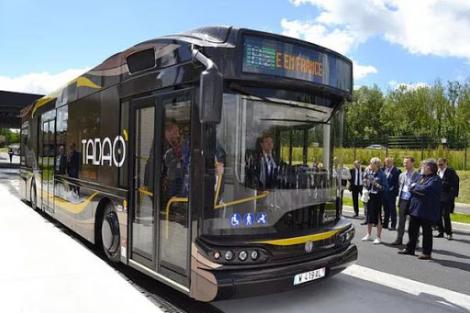
Its motorisation is composed of a powerful electric motor (250 kW) powered by a high-capacity battery pack (132 kWh), combined with a 30 kW fuel cell that increases the range to over 350 km. Maximum energy efficiency for a long range.
Outlook for next year: New Businova H2 deliveries planned for 2020/2021: 5 for Versailles (BE Green), 1 for Le Mans, 5 for HYPORT (Toulouse), 5 for Auxerre and 6 other vehicles with different motorisations (Fiche 5.1 and www.businova.com/fr/ ).
Work is underway to develop intercity coaches with greater autonomy and to integrate this dynamic into local hydrogen networks.
Towards the semi-autonomous and flexible vehicle (Reva 2)
Thanks to the well thought-out ambition of an « autonomous vehicle, but assisted by a guide line stuck to the ground », the Reva 2 technology developed by the innovative holding company RP-H founded by the exceptional innovator Raoul Parienti, in Nice, is now offering a system of vehicles that can move autonomously in city centres.
The vehicle is also flexible, in that a driver can take it off the guiding line stuck to the ground, and move like any other vehicle, both in town and on the roads.
The town of Cagnes sur Mer was the first to sign up to test the system, and Nice has also applied.
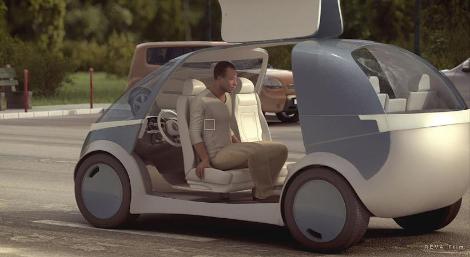
Reva 2 autonomous module. See fact sheet and video (Fact sheet 5.2 and www.reva2.eu/)
A solar-powered bicycle: the Wello
It did not seem obvious that it would be possible to ride a bicycle efficiently with the help of solar energy. An innovator, Arnaud Chéreau, from Le Mans, France, has developed a bicycle that is now operational and being tested on Reunion Island.
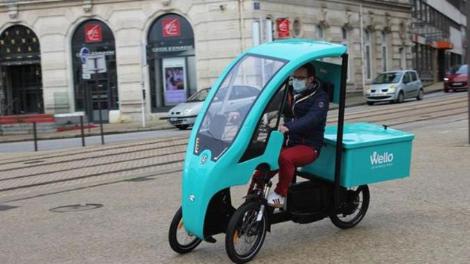
It is ideal for last mile delivery/transport and is perfectly suited to the constraints of city centres. (Sheet 5.3 and www.wello.io/)
Pragma industries’ hydrogen bike
Pragma Industries offers a hydrogen-powered bicycle based on its compact fuel cell (see sheet 1.5).
This bicycle allows for completely decarbonised mobility and frees itself from the constraints of battery recycling by using hydrogen as a fuel, thanks to a compact on-board hydrogen fuel cell. This bike offers an unrivalled range of 150 km on a single charge. (Sheet 5.4 and www.pragma-industries.com/fr/)
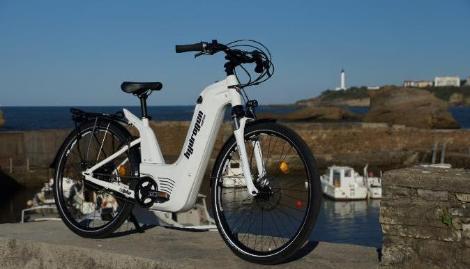
Rural carpooling
It is well known, especially since the success of Blablacar in Europe, that carpooling is one of the cheapest city-to-city transport solutions. But there were no such solutions for the rural world.
In 2010, the town of Moissac launched Rezo Pouce, a secure rural carpooling system by registering participants at the town hall, and by determining appropriate places to wait for vehicles. Since then, its system has been adopted by over 2,200 towns and villages in France. It is being exported abroad, and is expanding into additional services for seniors in the areas concerned.
The success of this system is linked to a real quality of leadership: Rezo Pouce organises training in Moissac in the leadership of this type of « social and solidarity » network. Sheet 5.5. and rezopouce.fr/
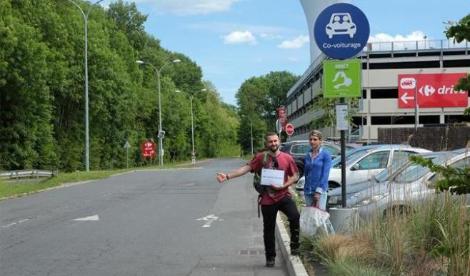
Secure carpooling call: all participants are declared to the town hall and the meeting points are in official dedicated places
Referencias
links to sheets : inks to the sheets see pdf doc attached(pdf/710 – icdd_rpertoire_des_innovations_citoyennes_produrable_200720.pdf)